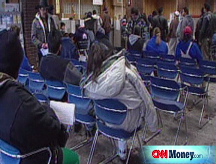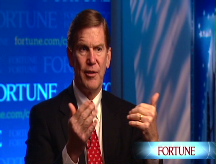Call it a recession, already
The National Bureau of Economic Research gets to make the official call. What's it waiting for?
NEW YORK (CNNMoney.com) -- Nearly 1.2 million jobs have been lost this year. The unemployment rate is at its highest level since 1994. Retail sales were dismal last month and for automakers, October was the worst month in more than a quarter-century.
But guess what? The United States is still not officially in a recession.
That's because a recession is only defined by a group of academics called the National Bureau of Economic Research.
It's not the media's call. It's not the President's or Congress' call. Federal Reserve Bank of Atlanta president Dennis Lockhart said in a speech Friday that the data "indicate" we are in recession, but heck, even Fed chair Ben Bernanke doesn't get to make the call.
According to the NBER's Web site, a recession "is a significant decline in economic activity spread across the economy, lasting more than a few months, normally visible in real GDP, real income, employment, industrial production, and wholesale-retail sales."
Hmmm. Now let's see. Significant decline in activity across the economy? Check.
Has it lasted more than a few months? Check.
Has it shown up in GDP, the job market and with manufacturers and consumers? Uh...check.
"It is academic at this point," said Sean Snaith, director of the Institute for Economic Competitiveness at the University of Central Florida in Orlando. "It might just settle a few bets in the faculty lunch room. The credit freeze was the death blow that pushed an economy that was teetering on the edge of recession into one."
So what's the NBER waiting for? And by the time it finally states the obvious, will anyone care?
Now to be fair, the NBER has to be responsible. It would have been unwise for these economists to rush to declare a recession as soon as it started to see signs of weakness - that alone could get consumers and businesses scared, creating a self-fulfilling prophecy.
In addition, even though the NBER describes itself as "nonpartisan" and "unbiased," it surely didn't want to drop the R-bomb in the middle of a presidential campaign.
But an announcement could be coming very soon. According to a report on Bloomberg Friday morning, Stanford University economist Robert Hall, who heads the NBER's business cycle dating committee, said that recession evidence was now "conclusive" in his opinion.
Hall was not immediately available for comment and neither was a spokeswoman for the NBER.
Still, what value, if any, will there be when the NBER does finally make its recession concession?
As I've argued in this column for most of the year, it is clear that many consumers are struggling financially regardless of what word we use to describe economic conditions.
Strangely enough, the long-awaited recession announcement could actually be good news because it might mean that recession is closer to the end than the beginning.
Back in 2001, the NBER ultimately decided the recession began in March but didn't announce it until November. The NBER later declared that the recession was over by November of 2001, although not until July 2003.
The NBER came very late to the recession party in the early 1990s as well. It announced the start of the 1990 recession in April 1991 and later decreed that this recession actually ended in March 1991.
"To some degree, the announcement of a recession is a non-event. But perversely it may be good news, especially if they date the start back to the end of 2007, because it may send the message that mathematically we could be closer to the end," said Liz Ann Sonders, chief investment strategist with Charles Schwab & Co., Inc.
Of course, this recession appears to be a much different animal than the prior two, which tended to be driven more by sharp downturns in business spending.
Clearly, we have an unprecedented financial crisis thanks to a housing bubble that burst spectacularly and led to huge problems for banks. This is now starting to hurt businesses outside of the financial sector.
Consumers are clearly feeling the pain caused by plunging home prices and rising unemployment. And it didn't help that the credit crunch was preceded by record high oil and gas prices this summer due to a commodities boom that has also now apparently gone bust.
That means that when the NBER makes its recession announcement (and I think there is no doubt it eventually will...probably early next year) it doesn't necessarily mean that it's time to celebrate.
After all, this recession is looking more like the one from the early 1980s. The NBER declared in January 1982 that the 1981 recession began in July 1981. But that recession didn't end until November 1982.
That was a recession that lasted 16 months. So if this recession began earlier this year -- although some argue it actually began in late 2007 -- and turns out to last as long as the one from 1981-1982, then it may not actually end until the middle or end of 2009.
"I don't want to contribute to the hyperbole about this recession but I do suspect this will be longer and deeper than the previous two," said Snaith.
And that jibes with some of the increasingly bearish outlooks for 2009 that are starting to come out from other economists.
"Everybody now believes we're in recession and that we are poised to be going into the worst part of it," said Chris Probyn, chief economist with State Street Global Advisors in Boston. "The end may be the spring or early summer 2009 but this could be a long recession with the shallow phase taking place in the first three quarters of 2008 and the steep declines yet to come."
No Buzz until Nov. 17: Whew. It's been a hectic two months with the credit crisis and the election. So I'm taking next week off to recharge the old batteries. Hopefully, the market will settle down a bit while I'm not Buzzing...although I wouldn't bet on it. Anyway, thanks to everyone for their emails and Talkback posts during the past few months. I love the feedback and I hope you all keep reading and commenting! ![]()




